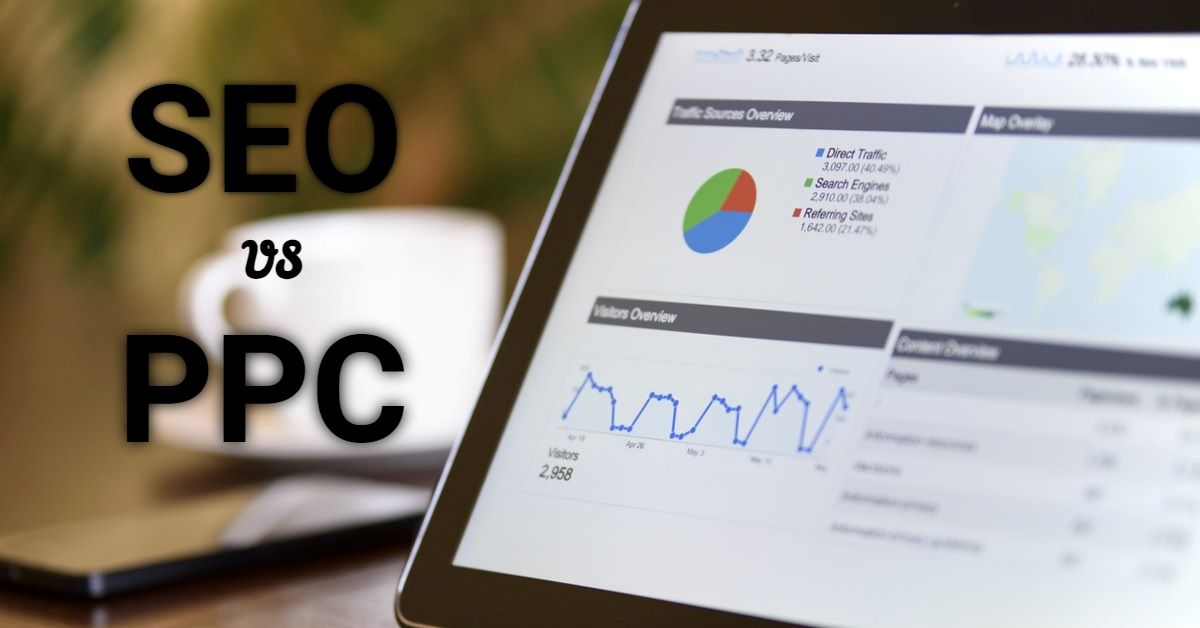
Both, SEO & PPC advertising offer distinct advantages and challenges, forcing businesses to make a crucial resource allocation decision. Both avenues offer distinct advantages and challenges. This blog explores the dynamics of SEO & Paid Adverts, emphasizing the importance of finding the right balance to achieve sustainable business success.
Table of Contents
ToggleUnderstanding SEO:
Search Engine Optimization is the practice of optimizing a website to enhance its visibility on search engine result pages organically. SEO focuses on improving various aspects of a website, including content quality, structure, and user experience. The primary goal is to rank higher on search engine results, attracting organic traffic and building long-term credibility.
Benefits of SEO:
- Cost-Effectiveness: Compared to paid adverts, the initial investment in SEO may be lower, providing long-term benefits without continuous financial commitments.
- Sustainable Results: While it takes time to see the full impact, SEO efforts can yield sustainable results, contributing to long-lasting organic traffic and improved rankings.
- Credibility and Trust: Websites that rank organically are often perceived as more credible and trustworthy by users, enhancing the brand’s reputation.
- Targeted Traffic: SEO strategies can be tailored to attract specific audiences based on keywords, demographics, and user behavior.
- Content Quality: SEO necessitates a focus on creating valuable and relevant content, fostering a positive user experience.
Challenges of SEO:
- Long-Term Play: SEO takes time and consistent effort to see significant results. Patience and ongoing optimization are key.
- Algorithm Updates: Search engine algorithms constantly evolve, requiring ongoing adaptation and SEO strategy updates.
- Competitive Landscape: Ranking well in competitive industries can be challenging and requires a robust SEO strategy.
Understanding Paid Advertising:
Paid Adverts involve placing online ads that appear on search engine result pages, social media platforms, or other websites. Advertisers pay a fee when users interact with their ads, making it a more immediate but potentially costlier method of driving traffic.
Benefits of Paid Adverts:
- Immediate Visibility: Paid ads provide instant visibility, making them an ideal choice for time-sensitive promotions or product launches.
- Control Over Targeting: Advertisers can precisely target their audience based on demographics, interests, and online behavior, ensuring that ads reach the right people.
- Measurable ROI: Paid advertising platforms offer detailed analytics, allowing businesses to track the performance of their ads and calculate Return on Investment (ROI).
- Flexible Budgeting: Advertisers have the flexibility to set daily or campaign budgets, controlling spending based on business objectives and performance.
- Enhanced Brand Exposure: Paid ads can increase brand visibility, especially for new businesses or those entering competitive markets.
Challenges of PPC:
- Cost-Based Traffic: You pay for each click, so careful campaign management is crucial to maximize return on investment.
- Competitive Bidding: Highly competitive keywords can drive up the cost per click, requiring strategic bidding strategies.
- Ongoing Management: PPC campaigns require ongoing monitoring, optimization, and budget adjustments for optimal performance.
SEO vs. PPC: Choosing the Right Approach
Now that you understand the strengths and weaknesses of both SEO & PPC, the crucial question is: Which one is right for your business? The answer is often a combination of both. Here’s a breakdown to help you decide:
- New Website or Launch Campaign: PPC is ideal for driving initial traffic and generating leads quickly during a new website launch or product introduction.
- Long-Term Growth Strategy: SEO offers a sustainable, cost-effective solution for long-term organic traffic growth and brand authority.
- Highly Competitive Niche: A strategic blend of SEO & PPC might be necessary to gain visibility in a competitive industry.
- Specific Targeting Needs: PPC allows for highly targeted campaigns to reach specific demographics or user interests.
Striking the Optimal Balance: Your SEO & PPC Synergy
The most successful online marketing strategies leverage both SEO & PPC in a complementary manner. Here’s how:
- Leverage PPC Keyword Research for SEO: Analyze keywords that perform well in your PPC campaigns to inform your SEO keyword strategy.
- Use PPC Landing Pages to Test SEO Content Ideas: Test high-performing PPC ad copy and landing page concepts to inform your SEO content creation.
- Retarget Website Visitors from Organic Traffic: Leverage PPC retargeting campaigns to re-engage users who visited your website through organic search.
- **PPC Ads Can Supplement Low-Volume Keywords: PPC costs can soar for long-tail keywords. Leverage PPC data to identify these valuable, low-volume searches and optimize your SEO content to capture organic traffic from them.
Building a Cohesive SEO & PPC Strategy
Here are some key steps to consider when building a cohesive SEO & PPC strategy:
- Define Your Business Goals: Clearly define your marketing objectives. Are you aiming for brand awareness, lead generation, or immediate sales?
- Identify Your Target Audience: Understand who your ideal customers are and their online behavior.
- Keyword Research: Conduct thorough keyword research to identify relevant keywords for both SEO & PPC campaigns.
- Develop Compelling Content: Create high-quality, informative content that resonates with your target audience and addresses their search intent.
- Optimize Your Website for Search Engines: Ensure your website is technically sound, mobile-friendly, and optimized for relevant keywords.
- Build High-Quality Backlinks: Acquire backlinks from reputable websites to boost your website authority in the eyes of search engines.
- Set Up and Manage PPC Campaigns: Create targeted PPC campaigns on relevant platforms, manage your budget, and track campaign performance.
- Monitor and Analyze Results: Regularly monitor the performance of both your SEO & PPC efforts, analyze data, and make adjustments for continuous improvement.
Tools and Resources to Get You Started
Several valuable tools and resources can help you implement a successful SEO & PPC strategy:
- SEO Tools: Ahrefs, SEMrush, Moz, Google Search Console
- PPC Platforms: Google Ads, Microsoft Advertising, Social Media Advertising Platforms
- Keyword Research Tools: Google Keyword Planner, Ahrefs Keyword Tool, SEMrush Keyword Magic Tool
- Content Marketing Tools: BuzzSumo, Yoast SEO, Grammarly
Conclusion:
By understanding the clear strengths and weaknesses of SEO & PPC, you can develop a complete online marketing strategy tailored to your business needs. Leveraging the synergy between these two powerful tools allows you to achieve optimal online visibility, attract your target audience, and ultimately drive business success. The best marketing strategies evolve – refine yours for ongoing growth. Stay updated on the latest SEO & PPC trends, continuously analyze your results, and adapt your approach for maximum impact.
This ultimate guide provides you with the knowledge and resources to embark on your SEO & PPC journey. Now, go forth and overwhelm the digital landscape!
Are you ready to propel your business to new heights in the digital landscape?
Unify your SEO & PPC efforts with Groww! We craft balanced online marketing strategies to maximize reach, build lasting brand credibility, and fuel sustainable growth. Whether you’re a seasoned marketer or just starting out, Groww empowers you to achieve your unique business goals through a perfect equilibrium of organic and paid search strategies.
FAQs regarding SEO & Paid Advertising
- What is the primary goal of SEO?
SEO, or Search Engine Optimization, aims to enhance a website’s visibility on search engine result pages organically. The focus is on improving various aspects of a website, including content quality, structure, and user experience, to rank higher on search engines.
- How does SEO contribute to long-term success?
SEO offers cost-effectiveness with lower initial investments, sustainable results over time, enhanced credibility and trust, targeted traffic through strategic optimization, and a focus on creating high-quality, relevant content for a positive user experience.vcsa
- What is the key advantage of Paid Advertising?
Paid Adverts provide immediate visibility, making it an ideal choice for time-sensitive promotions or product launches. Advertisers can control targeting based on demographics, interests, and online behavior, and it offers measurable ROI through detailed analytics.
- How can businesses find the right balance between SEO and Paid Advertising?
Businesses can find the right balance by aligning strategies with short-term and long-term goals, assessing budgets for cost-effectiveness, employing a strategic keyword approach, analyzing competition, considering target audience preferences, and strategically leveraging paid advertising for seasonal campaigns.
- Why is a balanced (SEO vs. Paid Advertising) approach recommended?
A balanced approach ensures a comprehensive online presence by driving sustainable organic traffic through SEO while strategically using Paid Advertising for immediate and targeted results. This integration aligns with business objectives, budget considerations, and target audience dynamics for optimal success.
- How can businesses maximize their online presence with SEO and Paid Advertising?
To maximize online presence, businesses should align strategies with business goals, allocate budgets based on cost-effectiveness, employ a strategic keyword approach, analyze competition, consider target audience preferences, and strategically leverage paid advertising for seasonal campaigns.
- How can I transform my digital marketing game with Groww?
To transform your digital marketing game with Groww, Contact Us today for free consulation!
- Share
